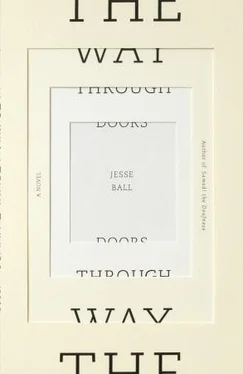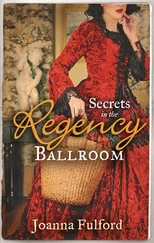They reached the second landing without incident and had more water there.
Morris began to do a little dance. He was obviously very pleased by his own dance, and he cried out to see if they were admiring it as well.
Onward then they proceeded to the third landing. This third stair was a great deal steeper than the others, and there was no longer any carpet. It was, in fact, so steep that they took to holding tight to the banister and descending backwards. This stair also was the longest of the three. The third landing was really hardly a landing at all but only a brief widening of a single step that accommodated a single leather chair, and then a brutal pinching of the stairs, which spun away down at frightening speed.
The bottom could now be slightly made out. It seemed to be a sort of cleared space with grass of sorts and even trees.
— Is that grass? asked Selah.
— You will see, said Morris quietly.
By this time their feet had begun to hurt quite a lot from the walking. Their legs were sore, and their hearts were heavy when they thought of how they would have to scale the stair to leave.
— How did you ever manage to walk up this and present yourself to us in complete readiness for a return trip down the stair? And furthermore, where do you get the food that you eat at the bottom? Presumably you do not grow coffee or keep pigs.
— Every now and then, said Morris, the Chinese man fetches things for us. He leaves them in the ladder chamber below the malachite plug. His family was sworn into this service many generations ago. The deed for the building passes through their hands. More than that I won’t say now, other than that I am good at climbing trees and at walking far, and so it is no wonder that I can climb and descend stairs with no trouble in the least.
To make evidence of this, Morris rapidly descended the stairs at the speed he was best used to.
— I will await you at the bottom, he cried, and bring my father tidings.
In moments he was out of sight.
— What a splendid fellow, said the municipal inspector.
— I like to think, said the guess artist, that if I had been in his situation, I would have grown to be a boy of such evident talent.
— The same, said Selah.
After an undefined period that might have been one hour or three, the stair broadened into its initial comforting width, and the carpet reappeared. The stairs ceased to turn, and led instead out into a broad meadow that stretched in a magnificent cavern.
The cavern was lit from above by what must have been more mirrored passages reflecting light from the sun accurately, easily, and well, all the way down through the earth, so that just as the sun shone upon the city streets, so too it shone at these subterranean depths.
The meadow was beautiful, the grass nicely shorn. Lovely oaks stood, their broad leaves a bright green.
Beneath one, on a small rise of land, Morris lay, awaiting them.
— Do the trees hold to the seasons? Selah asked him.
— Always, said Morris.
— How do they get enough water? asked the guess artist.
Morris pointed to a stream that ran out of one side of the cavern wall and crisscrossed the meadow. At one end there was a little waterfall that fell into a pond.
There was a little cottage on a hill in the distance. Smoke rose from its chimney.
Selah and the guess artist followed Morris the far walker through the meadow. Here and there were wildflowers. Bees trailed at the edges, and away in a small underbrush, Selah was certain he saw a fox dart by.
— What a wonderful place! he cried, as much to himself as to the others.
— You must tell my father, said Morris. He will be so pleased; I know it.
As they neared the cottage, they saw that a man was seated upon the front step, smoking a pipe. The cottage was an old-style saltbox house such as were built in the eighteenth century throughout the thirteen colonies.
— It is not a big house, said Morris. But it is right for us.
— Yes, said the guess artist. You seem to have done all right for yourselves.
The man waiting and smoking the pipe wore a pointy sort of knit cap, and had a short red beard. His eyes were very green, and his age could not easily be told.
— Corina, he said. They’re here.
A woman came out of the door wearing a large apron and a calico-print dress. She was broad, with a grand beaming smile upon her face. She looked just the sort to provide for them a pleasant and welcoming luncheon and afterwards a fine rest.
— Welcome, she said.
Her husband stood.
— I’m Kleb, he said. We live under the mountain.
— I have heard of the people who live under the mountain, said Selah. I never thought to be so lucky as to meet them.
— You are welcome here, said Corina again.
The guess artist took her hand warmly. Kleb shook hands with the municipal inspector. Morris looked out from behind his folks at the visitors.
— They are very hungry, he said.
— Come in, come in, said Kleb.
In they went. The saltbox house had a fine little kitchen at the back with a Dutch door. As the day was so pleasant, a table had been set out back of the house with chairs and many fine things to eat. It turned out that there was an entire farm laid behind the house and that the little family grew in fact everything that they needed to eat, and that Morris had been somewhat lying, for the only things the Chinese man brought them were exotic substances like coffee and sugar.
— I suppose, said Kleb, that you’d like to know how all this can be.
He took a bite of a thick ham steak, and chewed it awhile before continuing. On the table was more ham, cooked with honey on a spit over a fire, potatoes, pan-fried doughnuts hot and covered in cinnamon and sugar, leeks, string beans, corn on the cob, and lovely miter-shaped loaves of bread that had just come out of the oven.
— Yes, said Selah, between bites of doughnut. I would very much like to know everything that you have to say. I am looking for a girl. I know that she was on the stairs. I’ve seen a photograph of her there, and…
— We shall save such conversation for evening, said Kleb. It is better suited to the darkness. All tales are, don’t you think?
He looked them over in turn.
— You, he said to Selah, you are the municipal inspector. Am I right?
— Yes, said Selah, producing his badge.
— We have no use for that here, said Corina. Put it away.
Selah put it away, more than a little ashamed.
— I’m sorry, he said.
— She doesn’t like such talk at table, whispered Morris.
— And you, said Kleb to the guess artist. What do you do?
Corina looked very carefully at the guess artist. So too looked Morris and Kleb. They examined him in a very thorough fashion.
— Stand up, said Corina.
The guess artist stood.
— Turn around, she said.
He turned around.
— What might you be? said Corina to herself.
— I am a guess artist, said the guess artist proudly.
— He’s the best one there is, said Selah.
— A guess artist! said Corina. All right, then, guess what I’m thinking.
The guess artist looked at Corina with the care that she had invested in his own examination.
— You were born, said he, in Martins Ferry, Ohio, the daughter of a butcher. He taught you to read in Latin and Greek, and you ran away from home. You came here by accident when you were sheltering from a snowstorm in the foyer of Six Quince Street, and by chance the Chinese man was coming up out of the trapdoor. Of all things in the world you are most proud of the fact that you can name every Roman senator that ever existed by order of age, geographical origin, chronological election, or name.
— Can you really? asked Morris.
Читать дальше












